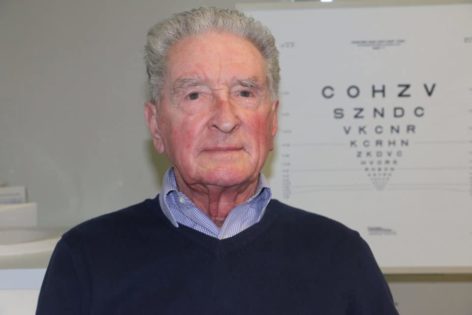
Eyesight restored for Blind after Stem Cell treatment success
04/04/2018


in 2015, 23.7 million American Adults age 18 and older reported vision loss

Worldwide, an estimated 253 million people live with vision impairment

The most common form of sight-loss is age-related macular degeneration (AMD)

6.5 million Americans over age 65 have a severe visual impairment in the form of AMD

Among older people with vision impairment, 57.2% are at risk of mild or moderate depression compared to 43.5% of those without vision loss
AMD (age-related macular degeneration) causes rapid loss in the central area of vision and The American Academy of Ophthalmology estimates that around 9.1 million Americans have early stage AMD. With nearly 2.1 million Americans age 50 and older having late AMD, the stage that can lead to severe vision impairment.
AMD is a leading cause of vision loss in the U.S. It destroys the macula, the part of the eye that provides sharp, central vision needed for seeing objects clearly.
The most common eye conditions are Age Related Macular Degeneration, Glaucoma, Diabetic Retinopathy and Cataracts. Which collectively affect around 42 million Americans, though there are dozens of eye conditions – some very common and some much more rare.
Research into Stem Cell Treatment
In this latest case two patients in the UK, with the most common form of sight-loss, age-related macular degeneration (AMD), have regained their reading vision after ground-breaking stem cell treatment.
The two patients, a man in his 80s and a woman in her 60s, were given a special “patch” of stem cells to repair the damage to their eyes, as part of a small-scale clinical trial. Both went from not being able to read at all, even with glasses, to reading 60-80 words a minute with normal reading glasses.
Douglas Waters, 86, was diagnosed with his AMD back in July 2015, and was treated with stem cells just three months later.
He said: “In the months before the operation my sight was really poor and I couldn’t see anything out of my right eye. I was struggling to see things clearly, even when up-close.”
“After the surgery my eyesight improved to the point where I can now read the newspaper and help my wife out with the gardening.
“It’s brilliant what the team have done and I feel so lucky to have been given my sight back.”
Taking place at Moorfields Eye Hospital and University College London, the treatment involved surgeons engineering a patch of tissue derived from stem cells and inserting it under the retina. This is the part of the eye that registers an image, similarly to a digital camera chip.
The retina is found at the back of the eye, formed from several layers. AMD damages the part of the retina which separates blood vessels from the layer of nerves. In this new stem cell treatment, researches grew stem cells and turned them into a perfect copy of this part of the retina.
But this may be only the tip of an iceberg in terms of eyesight related treatments with stem cells.
This new research finding now offers hope to thousands, and researchers have been united in their support of further study and development of the breakthroughs that have been achieved.
However, there is still a long way to go and all experts would strongly advise speaking to your ophthalmologist before considering seeking out potential trials or treatments.
Protect Their Future Health
If you want more information on how you could bank your children’s baby teeth for potential future therapeutic use, have a chat to one of our team or download our guide to stem cell banking.
Keep up to date with the latest developments and news from BioEden surrounding stem cell therapy for the treatment of sight loss.

04/04/2018

28/04/2017

18/01/2017

21/12/2016